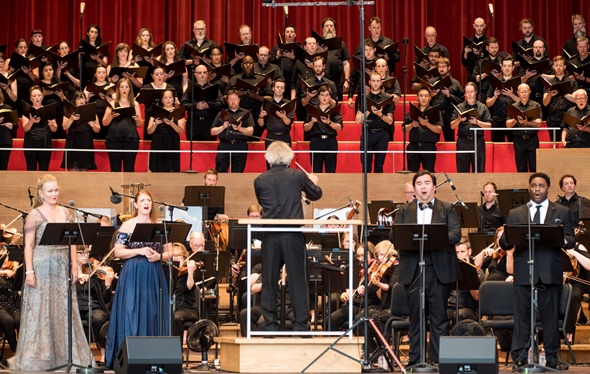Kalmar, Grant Park forces take on Beethoven’s mighty Missa Solemnis and serve up a thrilla

Carlos Kalmar leads the Grant Park Festival Orchestra and Chorus with a vocal quartet in Beethoven’s Missa Solemnis. (Photos by Norman Timonera)
Review: Grant Park Festival Orchesta and Chorus, with vocal quartet, led by Carlos Kalmar. At Pritzker Pavilion, Millennium Park.
By Lawrence B. Johnson
It’s hard to say which was the more remarkable, music director Carlos Kalmar’s sheer chutzpah in programming Beethoven’s monumental and indeed daunting Missa Solemnis for the Grant Park Music Festival or the thrilling success of the June 28 performance by all the vocal and instrumental forces involved.
Actually, I brought up what seemed to me this daring gambit when I spoke with Kalmar about the current summer’s repertoire last spring. His response was a sort of rhetorical shrug: More or less, oh yeah, we do it from time to time. OK, I thought, but not everyone does. The Missa Solemnis, a towering masterpiece from Beethoven’s late period that occupied him for several years even as he was composing the Ninth Symphony, is an intensely demanding work for everybody – orchestra, chorus and four vocal soloists; conductor, too, for that matter.

Mezzo-soprano Siena Licht Miller, left, and soprano Maeve Höglund, part of a strong matched set of solo voices.
Kalmar, who this summer observes his 20th anniversary at the Grant Park Festival helm, managed to summon the transcendental beauty and power of Beethoven’s music with the directness, energy and clarity one might expect from the Fifth Symphony, a model of concision.
The Missa Solemnis is not concise. Though Beethoven used the conventional text of the “ordinary” mass – Kyrie, Gloria, Credo, Sanctus, Agnus Dei – his prodigious musical elaborations stretch the running time to some 80 minutes, which makes it the longest of any of his works apart from the opera “Fidelio.” It may be the most ambitious without qualification.
For all it shares with the majesty, technical finesse and magnificence of the Ninth Symphony, the Missa Solemnis lies closer in its intellectual rigor to Beethoven’s late string quartets and piano sonatas. In that sense, it’s something of a throwback to Bach’s Mass in B minor or even to the polyphonic music of the Renaissance. Indeed, two of the Missa’s most staggering episodes are grand fugues – “In gloria Dei patris. Amen” in the Gloria and “Et vitam venturi saeculi, amen” in the Credo. The Grant Park Festival Chorus delivered both of these intricate and emotionally charged passages with expressive conviction matched by technical security.

Bass-baritone Michael Sumuel, right, and tenor John Matthew Myers rounded out the Missa Solemnis quartet.
That was the case throughout. (A keenly attentive audience swarmed forward in the Pritzker Pavilion when dark skies suddenly unleashed a downpour. Some brave souls on the exposed green simply elected to get wet rather than flee.) If Kalmar’s high-intensity approach to the work sometimes felt driven, the chorus prepared by Christopher Bell – an aggregation assembled, like the orchestra, from hither and yon – answered the call with heady stamina, exuberance, luminosity and, not least, accuracy. Beethoven’s grandiose consecutive settings of the Gloria and, especially, the tremendous Credo, the core of the work, would challenge the staying power of any chorus; but the Grant Park ensemble sustained an exuberance bordering on ferocity right through the Credo’s crowning fugue.
While Beethoven opted to weave the four solo voices into the larger musical fabric rather than spotlighting any of them in a featured role, his music for the quartet is radiant, exposed and formidable. It’s all too easy to sink a production of the Missa Solemnis by assigning the quartet duties to singers who can’t handle the deceptive workload. Kalmar brought together a sterling matched set of strong young voices in soprano Maeve Höglund, mezzo-soprano Siena Licht Miller, tenor John Matthew Myers and bass-baritone Michael Sumuel.
It has been observed that Beethoven, who had lost his hearing entirely by the time of this Mass, gave little thought to the practicality – the human possibility – of his musical ideas for either chorus or orchestra. The same has been said of the Ninth Symphony. But like the chorus, the Grant Park Festival Orchestra dispatched its assignment with all the elements of grace, agility, potency and urgency intact. It was not for nothing that a beaming Kalmar dragged concertmaster Jeremy Black from his chair at the end to be recognized for his poetic solo work in the “Benedictus.”

